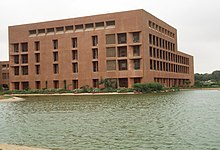Aga Khan University Hospital, Karachi
| Aga Khan University Hospital | |
|---|---|
| Aga Khan Health Services | |
 | |
 Aga Khan University Hospital, Karachi | |
 | |
| Geography | |
| Location | Karachi, Sindh, Pakistan |
| Organisation | |
| Care system | Private |
| Affiliated university | Aga Khan University |
| History | |
| Opened | 1985 |
| Links | |
| Website | Official Website |
| Lists | Hospitals in Pakistan |
The Aga Khan University Hospital (AKUH) in Karachi, established in 1985, is the primary teaching site of the Aga Khan University's (AKU) Faculty of Health Sciences. Founded by the Aga Khan, the hospital provides a broad range of secondary and tertiary care, including diagnosis of disease and team management of patient care.
Aga Khan University is Pakistan's largest private medical institute and hospital.
Facilities[]
Aga Khan University Hospital (AKUH) has 560 beds in operation and its in-patients have the region's lowest average length of stay of 4.0 days. The hospital is equipped to diagnose and treat medical (including cardiac), surgical, obstetric and gynecology, pediatrics and psychiatry patients. A total of 560 beds, 122 private and 117 semi-private air-conditioned rooms, 251 General Ward beds and 52 special care beds are available in ICU, CCU and NICU. The hospital has 17 main operating theatres. In addition to these, there are 4 operating theatres in Surgical Day Care and 2 in Obs/Gyn. Day Care Surgeries are performed at AKUH. Pharmacy, Radiology (including nuclear medicine), Laboratory, Cardiopulmonary, Neurophysiology and Physiological Measurement services are available at AKUH. AKUH Laboratory operates 47 phlebotomy or specimen collection centers in Karachi and in all major cities of Pakistan.[1]
Architecture[]
The Aga Khan Medical Complex, built on a 65-acre site in Karachi, was planned and designed by Payette Associates, a Boston, U.S.-based architectural firm.[2][3] It consists of a 721-bed hospital, a medical school for 500 students, a school of nursing, housing for staff and students, and a mosque. The building has been carefully designed to take into account the history, climate, environment, symbolism and the spiritual values of the Muslim culture.[4]
Accreditation[]
Aga Khan University Hospital, Karachi is a Joint Commission International (JCI) accredited hospital.[5]
Cooperation with other Karachi hospitals[]
In 2017, a joint board was set up to conduct a study of all major hospitals in Karachi under the Karachi Municipal Corporation (KMC) and the Aga Khan University Hospital to try to help upgrade all of KMC-affiliated medical facilities in Karachi.[6]
Aga Khan University Hospital is among the leaders in Pakistan in introducing new healthcare technology. In 2016, The Express Tribune (newspaper) reported, "The Aga Khan University Hospital has become the first medical centre to introduce the new advanced brain surgery technology, Neuro-Robotic Exoscope, in Pakistan."[7]
See also[]
References[]
- ^ Profile of Aga Khan University Hospital, Karachi on health.hamariweb.com website, Retrieved 9 August 2017
- ^ Legacy of Great Healthcare and Design: Aga Khan University Hospital Karachi on payette.com website, Retrieved 9 August 2017
- ^ "Payette Associates (hospital's U.S.-based architecture firm)". Retrieved 9 August 2017.
- ^ Payette, Thomas (1988). Theories and Principles of Design in the Architecture of Islamic Societies. The Aga Khan Program for Islamic Architecture. pp. 161–168. Archived from the original on 2012-10-03. Retrieved 2011-05-15.
- ^ Aga Khan University Hospital is an accredited organization by the Joint Commission International, jointcommissioninternational.org website, Retrieved 9 August 2017
- ^ Aga Khan University Hospital experts to help upgrade Karachi Municipal Corporation hospitals, The News International (newspaper), Published 22 February 2017, Retrieved 9 August 2017
- ^ Aga Khan University Hospital becomes country's first hospital to introduce 'Neuro-Robotic Exoscope, The Express Tribune (newspaper), Published 13 April 2016, Retrieved 9 August 2017
- Hospital buildings completed in 1985
- Aga Khan hospitals
- Hospitals in Karachi
- Teaching hospitals in Pakistan
- Hospitals established in 1985
- Aga Khan University
- 1985 establishments in Pakistan
